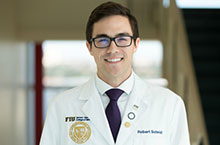Daniel Lumpuy Says He Is “Ridiculously Fortunate” to Graduate with Zero Debt Thanks to Wertheim Scholarship
 Daniel Lumpuy |
By his own admission, Daniel Lumpuy is “ridiculously fortunate.” According to the Association of American Medical Colleges (AAMC), 84% of medical students have debt. And of those who do, the median amount owed is $190,000. Lumpuy graduated from FIU’s Herbert Wertheim College of Medicine in 2018 with zero debt and is now an internal medicine resident at USF’s Morsani College of Medicine.
The 28-year-old is one of ten HWCOM students whose tuition is being paid for by the Dr. Herbert and Nicole Wertheim Family Foundation Scholarship.
“I am eternally grateful to the Wertheims,” says Lumpuy.
Herbert Wertheim, a longtime FIU benefactor and the college’s namesake, personally assists in selecting the Wertheim scholarship recipients. A man of humble beginnings who received the 2011 International Horatio Alger Award in recognition of his personal and professional accomplishments, Wertheim knows firsthand what it’s like to be a student struggling to make ends meet. He, too, won a scholarship to Southern College of Optometry in Memphis, which helped with his tuition even as he worked to pay for his living expenses.
“We pick out the best of the best because we believe it will help them go out and practice, maybe in areas they might not have the same financial success,” says Wertheim.
The issue of medical school debt is complex
A 2016 study published in the Journal of the American Board of Family Medicine found that high education debt exacts a human cost, including stress, suicidal thoughts, licensing exam failures, and voluntary withdrawal or dismissal from medical school. A recent national survey conducted by the AAMC indicated that the cost of a medical education was the top reason minority students choose not to pursue a medical degree.
This is particularly challenging for schools like HWCOM that are committed to a diverse student population.
“We are admitting more than 20% of a disadvantaged or underrepresented population of students, compared to 9% nationally,” says Marissa Miles, HWCOM director of financial assistance and alumni relations. All of the College of Medicine’s disadvantaged students are receiving some scholarship aid.
As a young college—the first class of students was admitted in 2009—HWCOM doesn’t have the same level of scholarship funds available as do older, more established medical schools. That’s why donors like the Wertheims are so critical.
“Scholarships are a recruitment tool that allows us to compete with older, more established institutions with significant endowments to entice students,” says Dr. John A. Rock, HWCOM’s founding dean and FIU senior vice president for health affairs.
© Pentera, Inc. Planned giving content. All rights reserved.
Disclaimer
